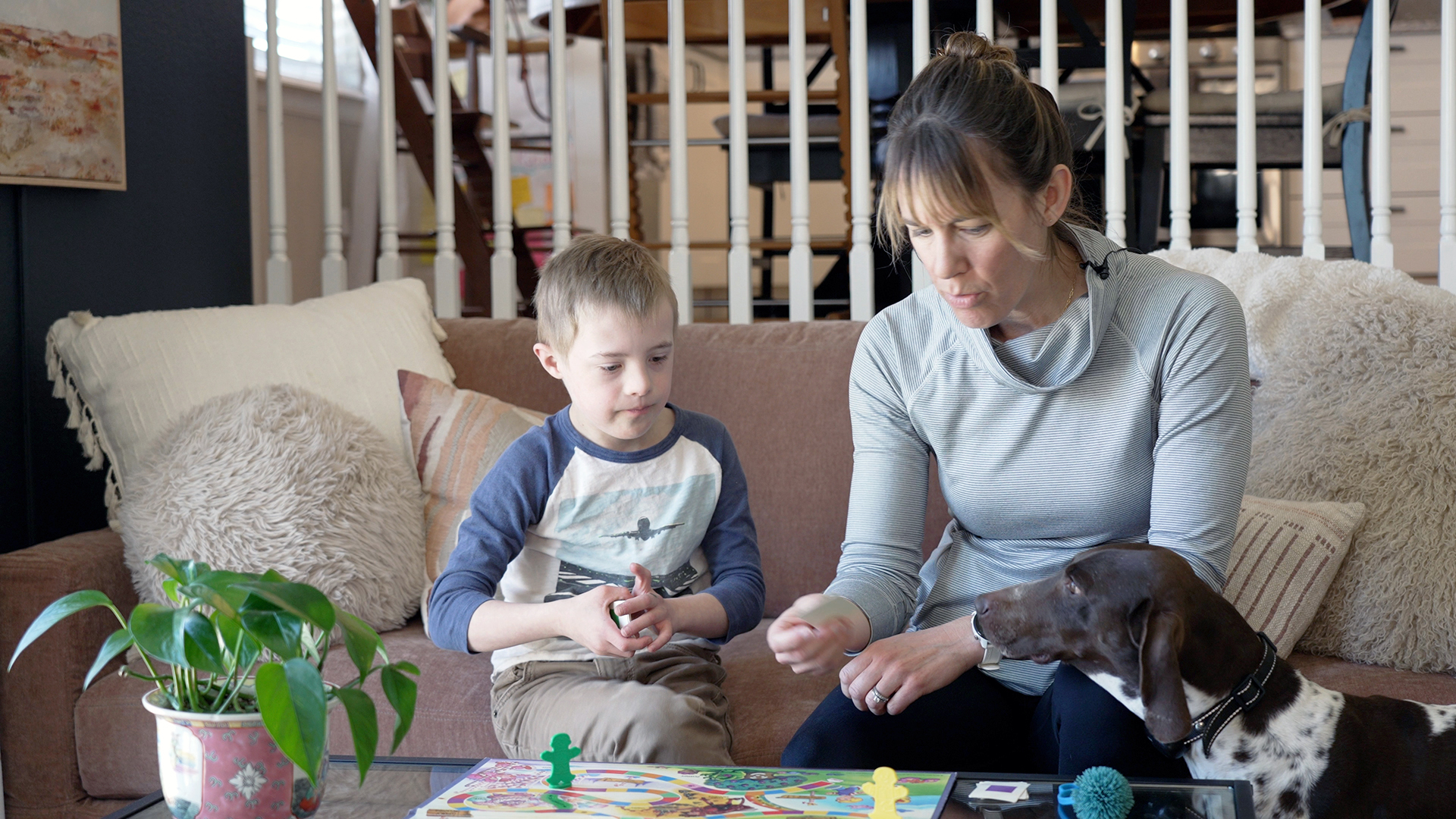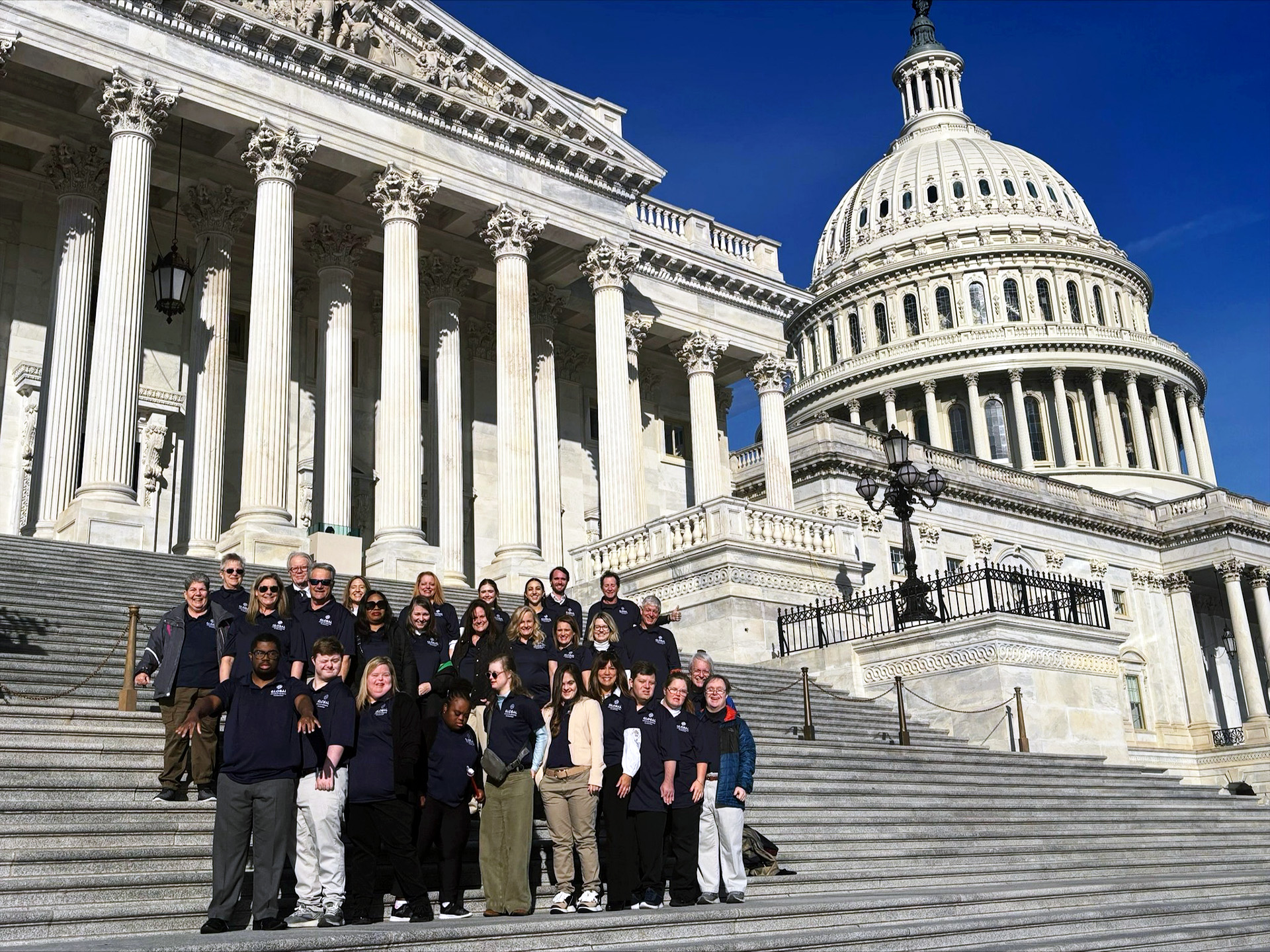Video by Ron Bend
A national study led by Colorado State University aims to dramatically improve intervention planning and early clinical care for young children with Down syndrome.
The CSU Developmental Disabilities Research Laboratory recently launched “Project CAPE-abilities, or Communication And Play Early abilities.” Researchers say it is the first large-scale, comprehensive, longitudinal study of early foundations of communication and play and their relation to other biomedical conditions in this population.
The $6.2 million, five-year study funded by a grant from the National Institutes of Health enables researchers to evaluate 225 children as young as 18 months old. Findings will inform early screening techniques for co-occurring conditions like autism or attention deficit hyperactivity disorder and will help clinicians identify children who may need more intensive intervention.
“This project is aligned with the broader goal of answering priority questions in the communities that we study and serve,” said CSU Professor Deborah Fidler from the Department of Human Development and Family Studies. “We’re not interested in asking research questions where the findings will sit on the shelf and gather dust. We want to know what the priorities are. And then we want to use our research toolkit to provide added information that will be immediately used in clinical settings.”
World Down Syndrome Day
March 21, or 3-21, is World Down Syndrome Day because people with the condition have three copies of chromosome 21 instead of two. One in every 700 U.S.-born babies, or about 6,000 each year, has Down syndrome, according to the Centers for Disease Control and Prevention.
In 2014, one of those babies was born to Elizabeth Jeub, who lives in Brighton. Her son Noah, 9, began life being fed by a tube to gain enough weight for open heart surgery at 3 months old.
“From birth to 3 years old, there’s so much going on, and a lot of it is just processing the diagnosis,” said Jeub, who helped found the Denver location of GiGi’s Playhouse, which offers free educational, therapeutic and career builder programs to children with Down syndrome.

Challenges in existing research
“There are a lot of gaps. It is a huge learning curve,” Jeub said. “Having that data from research to inform what therapy is right for each child can benefit a lot of us in this group.”
Findings from the CSU-led study will directly inform early screening practices and help clinicians identify which children may need more intensive intervention support as early as 18 months old.
The research will involve 75 children in California, Massachusetts and Colorado, where parents can visit Fidler’s lab at CSU or the University of Colorado Anschutz Medical Campus in Aurora.
The study includes 25 children at each location for three years in a row. All will be followed for three years with intermittent study visits. Interested families can call (970) 491-1969 or email ddlabcsu@gmail.com.
Down syndrome national study
The collaboration is among CSU researchers Fidler and Susan Hepburn in the Department of Human Development and Family Studies and Mark Prince from the Department of Psychology, plus Harvard University’s Nicole Baumer, University of California-San Francisco’s Somer Bishop and Noemi Spinazzi, and CU Anschutz’s Lina Patel.
Baumer is a medical doctor specializing in neurodevelopmental disabilities and the director of the Down syndrome program at Boston Children’s Hospital. Bishop is a professor in psychiatry and behavioral sciences. Spinazzi is a medical doctor and assistant professor of pediatrics in UCSF’s School of Medicine. Patel is an associate professor in psychiatry who works at Children’s Hospital Colorado at the Anschutz Medical Campus.
“Families often want information about their child’s development, what it means for the future, and how they can best capitalize on strengths and support their child’s needs,” Baumer said. “There are a wide range of abilities among young children with Down syndrome, and this first-of-its kind study will allow us to better understand what factors influence development.”
Bishop said she is increasingly asked about other diagnoses in children with Down syndrome and that screening tools were not built with those considerations in mind.
Early detection, early intervention
“It is critical that we develop better methods for assessing strengths and challenges in social-communication and play behaviors in children with varied developmental profiles,” Bishop said. “The prospective longitudinal design of this study will allow us to better understand how social-communication and play skills develop alongside cognitive, language and motor skills in children with global developmental delays.”
Noah had occupational, speech and physical therapy before he was 6 months old and behavioral therapy starting at age 4. He has participated in CSU studies since infancy.
Jeub said the experiences were invaluable.
“Research for all parents can be intimidating,” she said. “But the folks at CSU make the experience of participating in research enjoyable. They make it applicable.”
Noah enjoys writing and is proficient at math. On a sunny day in March, Noah hit balls off his T-ball stand to his mother. Family dog Coco wrangled a rope toy and tried not to get hit by Noah’s prodigious line drives.
“Whether it be games that you can play early on to improve executive functioning and cognitive development or speech development, those are huge things,” Jeub said. “It helps parents to feel empowered in a world where something suddenly came into your life that you weren’t expecting that you don’t know about, and that you feel powerless in. We hope to keep working with them for years to come so that we can see the fruits of the research.”
Resources for parents of Down syndrome children
Fidler said decades-old studies didn’t include tools now available. Down syndrome research funding has lagged, making this study crucial to identify targeted interventions and treatments.
“We are going to visit with families and their children and complete a very comprehensive set of activities to learn all about each child’s biomedical history and their early communication and play skills,” Fidler said. “And we know that for many young children with Down syndrome, these skills develop in ways that are aligned with their overall development.
“Thinking and reasoning and information processing most often develop in alignment with communication skills and play skills. For some children, however, play and communication skills do not develop in alignment with overall development. Those children may be at an elevated likelihood for a co-occurring diagnosis.”
Asked for advice for parents in a comparable situation, Jeub said: “Enjoy your children while they’re young. Don’t stress out about all the unknowns. They will meet those milestones and be off onto the next thing before you know it. So just enjoy where you’re at, because they will grow up and they all learn in their own time.”

Advocating for Down syndrome funding
In February, CSU faculty member Deborah Fidler was invited by the Global Down Syndrome Foundation to lobby members of Congress to support a bill that would increase funding levels.
If enacted, HR 7268, or The DeOndra Dixon INCLUDE Act of 2024, would raise funding at the National Institutes of Health up to $250 million. Fidler was seated behind Global Down Syndrome Foundation CEO Michelle Sie Whitten as Whitten testified during a Congressional subcommittee about the importance of the funding increase.
Read, watch more: Ram Scholars is an inclusive college program for adults with intellectual disabilities who want to build career-related skills. The first initiative includes agricultural work.
The Department of Human Development and Family Studies is part of CSU’s College of Health and Human Sciences.